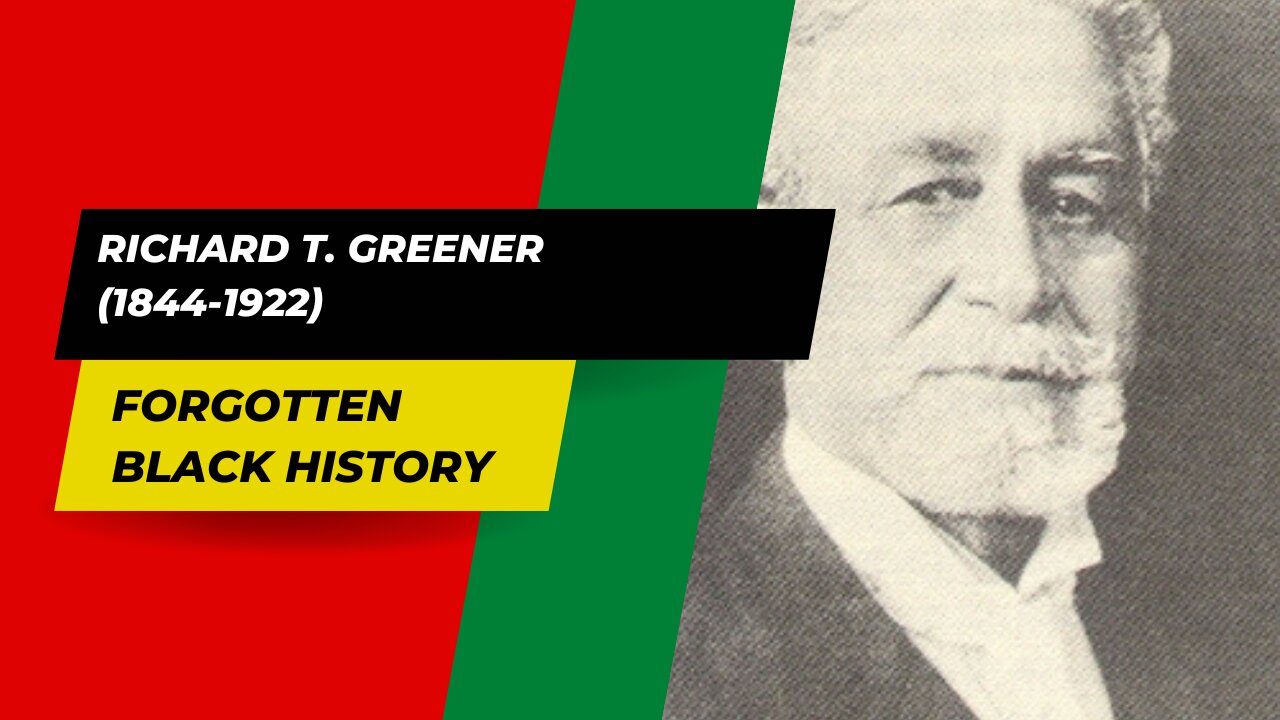Premium Only Content

RICHARD T. GREENER (1844-1922)
The son of a sailor, Richard Theodore Greener, a native of Philadelphia, Pennsylvania became the first African American to graduate from Harvard College. He later was assigned to serve the United States in diplomatic posts in India and Russia.
Greener lived in Boston, Massachusetts and Cambridge as a child but received his secondary education at Phillips Academy in Andover, Massachusetts and Oberlin College in Oberlin, Ohio, He entered Harvard in 1865 and in 1870 became the first African American to receive an A.B. degree from the institution. After graduation he was appointed principal of the Male Department at Philadelphia’s Institute for Colored Youth which later became Cheyney University. Three years later Greener became professor of Mental and Moral Philosophy at the University of South Carolina where he also served as librarian and taught Greek, Mathematics and Constitutional Law. While there, Greener entered the Law School and received an LL.B degree in 1876. His most prominent role as an attorney occurred in 1881 when he was part of the legal team that unsuccessfully defended West Point cadet Johnson C. Whittaker who was convicted of the charge of self-mutilation after an attack by racist fellow cadets. Whittaker had been one of Greener’s students at the University of South Carolina.
Active in the Republican Party, Greener was appointed United States Consul at Bombay, India in 1898 by President William McKinley. Greener never went to India because of the Bubonic Plague then raging in Bombay. Later that year he was transferred to Vladivostok, Russia, where he served as commercial agent until 1905. During his term Greener reported to Washington on the construction of the Trans-Siberian Railroad, the rapid growth of the European Russian population in the region, the status of the local Jewish population, and the local impact of China’s Boxer Rebellion in 1900. He was decorated by the Chinese government for his role in famine relief efforts in North China in the wake of the Boxer Rebellion.
Recognizing Siberia’s growing importance to United States economic interests, Greener called unsuccessfully for the U.S. State Department to establish a consul-general in Vladivostok. During the Russo-Japanese War of 1904-05 Greener supervised the evacuation of the Japanese from Sakhalin Island. In October, 1905 Greener was recalled from Vladivostok. He retired to Chicago, Illinois the following year and died there in 1922.
-
 1:01:09
1:01:09
Forgotten Black History
11 days agoDr. Ivan Van Sertima, For the People (1980)
693 -
 54:30
54:30
LFA TV
1 day agoThe German Strongman’s Arrival Is Imminent | Trumpet Daily 12.18.24 7PM EST
29.6K2 -
 2:04:11
2:04:11
Melonie Mac
5 hours agoGo Boom Live Ep 32! Soul Reaver Remastered!
25.4K6 -
 39:11
39:11
Sarah Westall
3 hours agoDigital Slavery and Playing with Fire: Money, Banking, and the Federal Reserve w/ Tom DiLorenzo
36.8K1 -
 1:38:38
1:38:38
2 MIKES LIVE
7 hours ago2 MIKES LIVE #157 ILLEGALS, PROTESTORS AND DRONES!
24K1 -
 1:01:03
1:01:03
LFA TV
1 day agoTHE LATEST SPENDING BILL IS AN ABOMINATION! | UNGOVERNED 12.18.24 5pm EST
28.7K33 -
 1:43:34
1:43:34
Redacted News
6 hours agoBREAKING! WARMONGERS PUSHING TRUMP TO LAUNCH PRE-EMPTIVE WAR WITH IRAN | Redacted News
134K232 -
 1:00:26
1:00:26
Candace Show Podcast
6 hours agoPiers Morgan x Candace Owens | Candace Ep 123
77.9K205 -
 2:06:51
2:06:51
Darkhorse Podcast
9 hours agoThe 256th Evolutionary Lens with Bret Weinstein and Heather Heying
59.3K26 -
 3:08:08
3:08:08
Scammer Payback
6 hours agoCalling Scammer Live
35.5K3